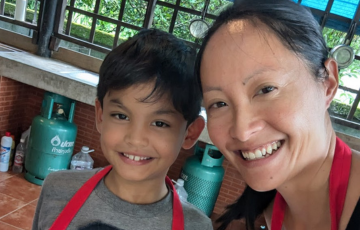During the five years it takes to progress through puberty, life with your teen can be a challenge.
Adolescent sexual feelings are very powerful and teens will struggle to deal with them. It is important to remember that experimentation is a normal part of adolescence.
This is a time when teens ‘try on’ adult roles and behaviours. Much to the dismay of parents, these behaviours may include experimentation with alcohol, drugs, smoking, and sex.
Remember, though peers strongly influence social behaviour, your teenagers are taking note of what you have to say about these topics.
Help them find a path to healthy sexuality
- be aware of your teen’s world. Read what they read, watch and listen to
- ask about their day - ind out what stresses, issues, and pressures they are dealing with
- help your teens to find accurate information on adolescent sexual health
- find out what is taught about sexual health in your teen’s school
- supplement school information with books and discussions at home
- talk openly with your teen about relationships, sexuality (not just sex), how he can make healthy sexual choices, contraception, sexually transmitted infections and pregnancy
Sexuality
There is more to healthy sexuality than teaching your teen about erections and menstruation. Talk with your teen about sexuality not just sex. To develop into a healthy adult, teens need to know about the powerful, joyful, and pleasurable aspects of sex.
- discuss what a healthy relationship is and talk about sex as part of a loving relationship
- talk about the value of abstaining from sex until adulthood
- discuss all aspects of physical intimacy
- share your values about sexual activity - listen to your teen as he explores his own views and values
- part of establishing healthy sexuality is exploring one’s sexual identity, gender role, and physical attractions - be prepared to talk openly with your child about heterosexuality, homosexuality, bisexuality and transexuality
- let your teen know that masturbation is a healthy part of sexuality and normal behaviour
- talk with your teen about sex, sexuality, and gender in the media, especially pornography
- avoid using scare tactics to frighten teens into abstinence - this is unlikely to be effective and it can hamper their healthy sexual development.
- empower your teen to develop the decision-making skills and maturity to make their own choices about their sexuality
Making Healthy Choices
Teens need to understand that healthy sexuality is all about making their own choices.
They need to feel empowered to control their own sexuality. If they don’t, they are at risk for bowing to peer pressure, coercion, abuse, and engaging in risky sexual behaviour. Teach your teen how to make informed decisions about his sexual health.
- help your teen determine what her sexual limits are and how she can communicate her values and decisions
- talk about respecting the limits of others
- talk about rape - make it clear that forced or coerced sex is both hurtful and illegal and that no one has a right to force someone else to have sex
- discuss how alcohol and drugs can influence a person’s ability to make good, safe decisions
- help your teen develop strategies for dealing with peer pressure.
- if your teen plans to be sexually active, make contraception options available
Relationships
Developing healthy friendships and romantic relationships is an important key to healthy sexuality for teens. They will need your help to discover what makes a good relationship healthy, and to identify the qualities of unhealthy and abusive relationships.
- get to know your teen’s friends by making them welcome in your home
- be available to listen to your teen talk about good and not so good times with friends
- avoid making any judgments - criticizing your teen’s friends will alienate them
- model healthy relationships for your teen - talk about your own relationships with your partner or spouse, your family, coworkers, and friends
- discuss the ways in which your relationships are healthy, and ways in which they may not be healthy
- talk about what you have done in the past, or what you are doing to make your relationships healthy for you
- talk about the characteristics of healthy, unhealthy, and abusive relationships
- teach your teen to respect themselves and others
If you believe your teen may be involved in an unhealthy or abusive relationship, take some time when you are both calm to talk. Put your concerns in clear, honest, non-judgmental language.
“I heard you crying last night after Chris dropped you off. Your arm is bruised. What happened?”
Make it clear that you love and support your teenagers and that you are there for them.
If you are in an unhealthy or abusive relationship, it is important for you to help yourself and your children by changing your situation. Seek counseling. If you or your children are in physical danger, leave the relationship immediately. Children and teens who experience violence and abuse in the home can suffer emotional, mental, and physical harm. They will have a difficult time establishing healthy relationships as adults.
Sexually Transmitted Infections
Teaching healthy sexuality includes arming your teen against sexually transmitted infections (STIs). Many teens are not aware of STIs and their symptoms and effects.
They may underestimate their chances of contracting a disease or downplay the risks involved in unprotected sex. Knowledge is the key to counteracting this risky outlook.
Research the following STIs and share the information you find with your child. Talk about the types of contraception that will protect him or her from STIs.
- Human Papilloma virus (HPV)
- Chlamydia
- Genital Herpes
- Human Immunodeficiency Virus (HIV)
- Hepatitis B Virus
- Gonorrhea
- Trichomoniasis (Trich)
- Syphilis
If your child has had unprotected sex, arrange for a visit with the doctor of your teen’s choice to check for STIs.
Pregnancy
Your daughter is pregnant. Impossible? No. Despite your guidance and support, your teen may make choices that lead her down this path.
Your son is pregnant. Impossible? No. A young man bears equal responsibility for an unplanned pregnancy.
What do you do?
Find your own strength and a sense of calm. Pregnancy is not an ending, but the beginning of a difficult path. Your child needs your wisdom, support, and resources.
Discuss the options. Provide your teen with information and resources on parenting, adoption, and abortion. Allow the two teens involved to make a decision, and then support them.
Did you know?
If your daughter has had unprotected intercourse within the past 72 hours and does not wish to become pregnant, “morning-after” or emergency contraception pills are available over-the-counter from a pharmacy.
More information on emergency contraception.
Contraception
Before your teen decides to become sexually active, make contraception options available. While you may not believe in sex outside of a committed relationship, your teen may not share your values.
Teens with access to contraception information and options are not more likely to have sex, but they are safer if they do. Make sure both young women and young men know how to protect themselves and their partners from unwanted pregnancy or sexually transmitted diseases.
- find out what your teen knows about contraception, pregnancy, and sexually transmitted diseases
- dispel any misinformation or myths, and give him the facts
- talk about the pros and cons of birth control pills and shots, diaphragms, intra-uterine devices, condoms for males and females, sponges, and spermicide
- make it clear that “pulling out” or using a rhythm method is not an effective form of contraception
- make it clear that a girl can get pregnant the first time and during her period
- talk to your teen about how to protect oneself during oral and anal sex, as well as mutual masturbation
- help your teen get access to safe, cheap contraception
If your teen has had unprotected sex, arrange for a visit with the doctor of your teen’s choice to check for STIs. Young women should be made aware that emergency contraception taken within 72 hours of unprotected sex may prevent pregnancy.



